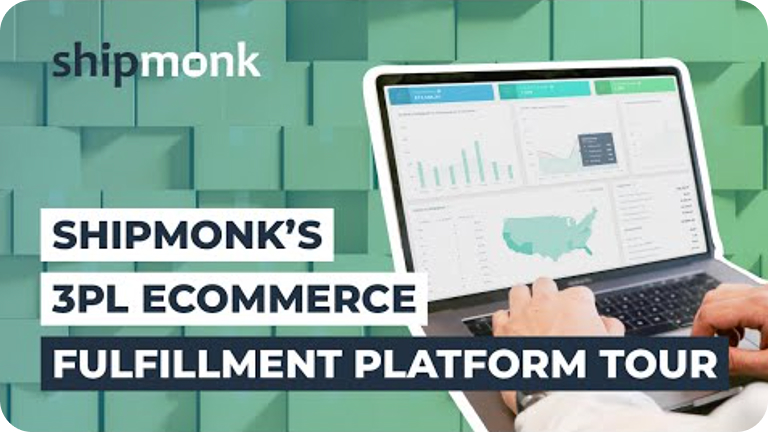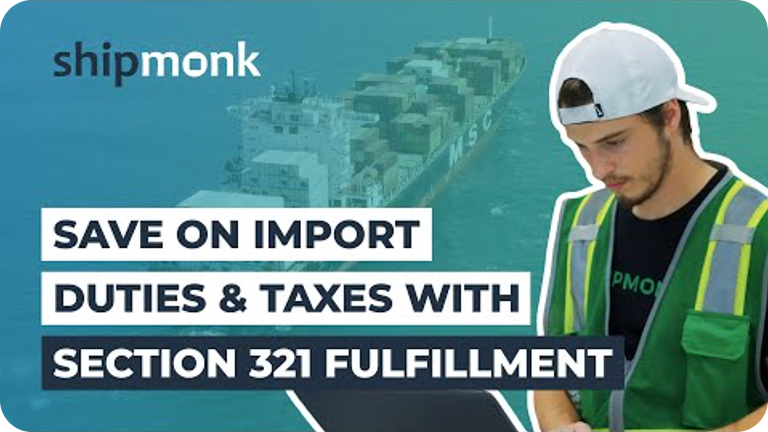Expanding your ecommerce business into global markets presents enormous growth opportunities. However, with this potential comes the need to understand and comply with country-specific regulations. International shipping isn’t just about adding a shipping label; it requires precision in managing tax systems, customs documentation, and trade laws. The margin for error is small, and the costs of mistakes—including delays, fines, or lost packages—can quickly add up.
For ecommerce brands aiming to scale globally, having the right compliance strategy is not just a good idea; it’s essential. That’s where ShipMonk comes in. By combining cutting-edge automation tools, real-time compliance checks, and personalized support, ShipMonk simplifies global operations so your business can grow confidently without the headaches.
Understanding country compliance
Country compliance represents the legal and logistical requirements businesses must meet to sell and ship products internationally. While each country has unique rules, the stakes are universally high. Mistakes like incorrect documentation, undervalued shipments, or missing tax registrations can lead to shipping delays, heavy fines, or damaged customer trust.
Key elements of country compliance
- Tax IDs:
- VAT (Value Added Tax) is mandatory in the European Union and many countries, requiring businesses to register, collect, and report VAT when selling to consumers in applicable regions.
- GST (Goods and Services Tax) is used in countries such as Canada, Australia, and India and comes with different rate structures and thresholds for registration.
- EIN (Employer Identification Number) is essential for businesses exporting from the U.S. and often required for customs clearances.
- Customs documentation:
- Accuracy matters. Correct Harmonized System (HS) codes, complete item descriptions, and declared values are critical. Failure to comply can result in delays or fines.
- Delivery terms (DDU vs. DDP):
- The choice between Delivered Duty Unpaid (DDU) and Delivered Duty Paid (DDP) has significant implications for business costs and customer experience.
Tax IDs: what you need to know
Tax IDs are the backbone of international compliance and tax reporting. Depending on where your business operates or ships products, you’ll need to ensure timely registration and management.
Regional breakdown
- European Union: Businesses must register for VAT if their annual sales exceed country-specific thresholds or if they store inventory in an EU nation. The EU’s One-Stop Shop (OSS) greatly simplifies VAT filings, allowing businesses to report for multiple EU countries via one central platform.
- United States: An EIN may be required for customs clearance or when fulfilling cross-border orders. Additionally, state-specific economic nexus laws mandate sales tax collection based on revenue thresholds, even without a business’s physical presence.
- Canada and Australia: GST/HST registration is mandatory for businesses exceeding revenue thresholds ($30,000 CAD in Canada and $75,000 AUD in Australia). Inventory warehousing or fulfillment operations may also trigger tax obligations.
Tips for managing tax IDs
- Use official government portals or hire licensed tax agents to register.
- Organize and link your tax ID numbers directly with your ecommerce platform and 3PL provider for seamless compliance.
- Stay updated on changes, like the EU’s simplified OSS system or evolving U.S. nexus laws.
Delivered duty unpaid (DDU) vs. delivered duty paid (DDP): what’s the difference?
How you handle duties and taxes influences both operational costs and customer satisfaction.
- DDU (Delivered Duty Unpaid):
Customers pay taxes, duties, and fees when the shipment arrives. While this reduces upfront costs for sellers, unexpected charges can frustrate buyers and lead to abandoned deliveries. - DDP (Delivered Duty Paid):
Businesses handle duties and taxes upfront, ensuring a seamless transaction for customers. While this option increases seller costs, it boosts customer satisfaction and fosters repeat business.
How ShipMonk helps simplify delivery terms
ShipMonk’s automation tools manage duty and tax calculations, helping ecommerce brands implement DDP more easily. By integrating DDP with precise shipping costs upfront, ShipMonk ensures no unpleasant surprises for your customers, building loyalty and trust.
Staying ahead of regulatory changes
Regulations governing international trade and ecommerce are constantly evolving. Staying informed is crucial to protecting your business and ensuring compliance.
Emerging trends and changes
- The EU’s new IOSS VAT guidelines simplify tax filing for cross-border sales while introducing stricter enforcement.
- Post-Brexit customs and VAT rules in the UK have added complexity for businesses shipping to or from the region.
- U.S. states continue to refine and expand economic nexus rules, requiring careful monitoring for marketplace sellers and direct-to-consumer brands.
Compliance tips
- Sign up for regulatory newsletters or alerts to stay in the know.
- Conduct regular audits of customs records, HS codes, and declared values.
- Partner with a proactive 3PL provider like ShipMonk to monitor updates and manage these changes seamlessly.
Best practices for country compliance
Create a robust compliance checklist
- Register for all necessary tax IDs, such as VAT, GST, or EIN.
- Use accurate Harmonized System (HS) codes for all shipments.
- Ensure invoices include:
- Detailed item descriptions.
- Accurate valuations.
- Country of origin info.
- Choose between DDU or DDP based on your market’s expectations.
- Track and store all shipping, tax, and customs data securely for easy access during audits.
Clear communication with customers
- Be transparent during checkout about who will handle taxes and duties.
- Leverage DDP when possible to minimize surprises for end customers.
- Use ShipMonk’s integrated tools to automate real-time tax and customs calculations.
Why ShipMonk?
International compliance can feel overwhelming, but ShipMonk’s blend of technology and expertise simplifies the process. Here’s how we make compliance stress-free for ecommerce brands worldwide:
- Automated tax tools: Seamlessly register for VAT, GST, or EIN and simplify filings with built-in compliance monitoring.
- Streamlined DDP implementation: Automate tax and duty calculations, enabling hassle-free shipping experiences for your customers.
- Regulatory adaptability: Stay ahead of rule changes with proactive updates, audits, and real-time solutions.
- Global expertise: From fine-tuning customs documentation to navigating complex international shipping terms, ShipMonk is the partner that helps you scale with confidence.
Final thoughts
Global ecommerce offers incredible rewards for businesses ready to take the leap. But mastering compliance is essential—not just to avoid costly errors, but to build trust and achieve long-term success. By partnering with ShipMonk, you gain the tools, systems, and expertise needed to excel in global markets.
We don’t just streamline logistics—we empower your business to grow. With ShipMonk by your side, compliance is no longer a barrier; it’s your gateway to international success.
About the Author:
Devin Knight is the Vice President of Transportation & Planning at ShipMonk. With over 15 years of experience in logistics, compliance, and carrier relations, Devin has built and optimized multi-carrier solutions for brands worldwide. Having worked with leading companies like Bongo International, Stamps.com, and Flexport, Devin brings unmatched expertise in simplifying global trade. At ShipMonk, Devin leads innovative strategies to help ecommerce businesses expand confidently, scale seamlessly, and unlock their full potential.





